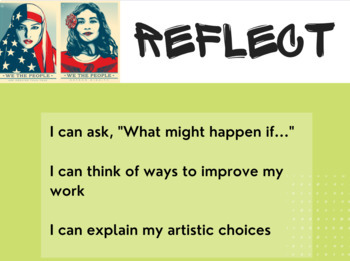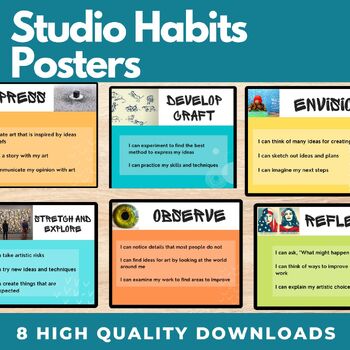

Understand (Arts) Community: Learning to interact as an artist with other artists (i.e., in classrooms, in local arts organizations, and across the art field) and within the broader society.Stretch and Explore: Learning to reach beyond one’s capacities, to explore playfully without a preconceived plan, and to embrace the opportunity to learn from mistakes.Reflect: Learning to think and talk with others about an aspect of one’s work or working process, and learning to judge one’s own work and working process and the work of others.Natural Science Vol.2 No.12, December 28, 2010. Related Vocabulary: Technique Skill Practice Material Grow Expand Learn Tool(s) Medium / Media Studio Progress Broaden Hone Exercise Approach Procedure. Studio thinking 2 : the real benefits of visual arts education / Lois Hetland, Ellen Winner, Shirley Veenema, and Kimberly M. Studio thinking: The real benefits of visual arts education. We present the Habits of Mind in an oval because they are non-hierarchical, so none logically comes rst or last. I take care of tools, materials, my work, and the studio. Eight Studio Habits of Mind Studio Thinking 2.

Observe: Learning to attend to visual contexts more closely than ordinary “looking” requires, and thereby to see things that otherwise might not be seen. The Studio Habits of Mind (SHoM): Develop Craft I learn about and practice new media, skills, or techniques that I use in my ar tmaking.See more ideas about habits of mind, art classroom, teaching art. Express: Learning to create works that convey an idea, a feeling, or a personal meaning. Explore Stephanie Elliotts board '8 studio habits of mind', followed by 155 people on Pinterest.These dispositions are laid out as the eight Studio Habits of Mind. Through their observation of arts education, they concluded that in arts classes, students develop a set of dispositions that are largely helpful and transferable to all academic subjects. Envision: Learning to picture mentally what cannot be directly observed, and imagine possible next steps in making a piece. The Studio Habits of Mind (SHoM) were developed by Harvard Project Zero researchers.Engage and Persist: Learning to embrace problems of relevance within the art world and/or of personal importance, to develop focus conducive to working and persevering at tasks.Utilize the 8 Studio Habits of Mind Develop Craft, Engage and Persist, Envision. I use this character to teach my elementary students about Express (Studio Habits of Mind).I introduce each member of the 'Art Squad' over a period of a few. Develop Craft: Learning to use tools, materials, artistic conventions and learning to care for tools, materials and space. means of personal expression and communication.Based on research into and descriptions of the characteristics of effective thinkers and high performers, theįramework focuses on the patterns of thought and behavior individuals must draw upon in order to effectively navigate complex and uncertain situations. For the purposes of conserving space I will simply. The Studio Habits form a core rational for the TAB classroom. All arts classes are graded using a custom rubric based on the National Core Arts Standards and the Studio Habits of Mind framework developed by Harvard Project. These Habits mirror what working visual artists do to succeed. Created by Harvard researcher, Lois Hetland, the Studio Thinking framework represents best practices for art students and educators. The Institute's mission is to transform schools into learning communities where thinking and Habits of Mind are taught, practiced, valued, and infused into the culture. The studio habits of mind (SHoM or SHoTM). Tap into your students critical thinking skills with these 8 Studio Habits of Mind art room posters. Bena Kallick, co-founders of the Institute for Habits of Mind. They are displayed by intelligent people in response to problems, dilemmas, and enigmas. The Habits of Mind are a set of thinking dispositions at the core of social, emotional, and cognitive behaviors.


 0 kommentar(er)
0 kommentar(er)
